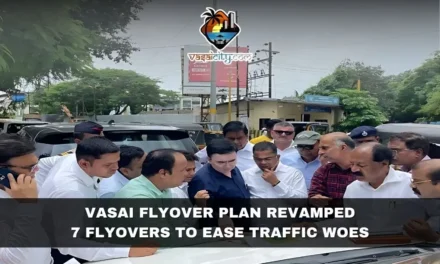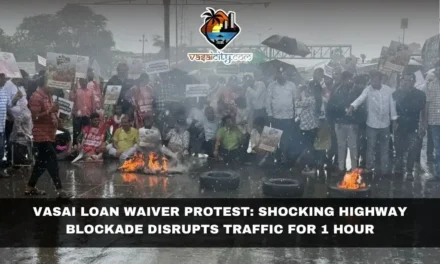In the quiet suburb of Virar, to the west of bustling Mumbai, a heart-wrenching tragedy unfolded on a sunny Friday afternoon. A young boy, merely five years old, and his 60-year-old grandmother were fatally struck by a speeding water tanker, casting a dark shadow over the local community and igniting fervent calls for improved road safety.
The incident took place near the Vyke buildings, a well-known residential area in Virar West, around 2:00 PM. The boy, identified as Vivaan Yadav, and his grandmother, Amravati Yadav, were on their routine walk to his school when tragedy struck. As described by eyewitnesses, the tanker, seemingly out of control, plowed into the unsuspecting pair. Vivaan was tragically crushed under the vehicle’s massive tires and died instantly at the scene. His grandmother, Amravati, sustained severe injuries and was rushed to a nearby hospital by locals. Despite the doctors’ efforts, she succumbed to her injuries shortly after, leaving the Yadav family and their community in profound grief.
The driver of the tanker, in a panic, fled the scene immediately after the accident, leaving the vehicle behind. This act of hit-and-run sparked outrage among the local residents, who have long complained about the reckless behavior of many tanker drivers in the area. According to them, it is not uncommon to witness tanker drivers operating their vehicles carelessly, and sometimes under the influence of alcohol, posing a significant risk to pedestrians and other road users.
The local police, upon receiving the news of the accident, promptly arrived at the scene to conduct an investigation and prepare a detailed report. The abandoned tanker was seized as part of the investigation process. The Arnala police are currently on the lookout for the absconding driver and have appealed to the public for any information that might lead to his arrest.
This tragic incident has once again highlighted the perilous state of road safety in suburban areas like Virar, where rapid urbanization and inadequate infrastructure often combine with lax enforcement of traffic laws to create deadly outcomes. Local residents lament that despite repeated complaints and pleas to the authorities, little has been done to curb the menace of negligent driving. They accuse both the traffic and local police of negligence, claiming that a lack of stringent checks and balances has made the roads unsafe for pedestrians, especially the elderly and children.
In response to the incident, community leaders and concerned citizens have rallied together to demand immediate action from local government officials. They are calling for stricter enforcement of traffic regulations, including regular checks on heavy vehicles and stringent penalties for those found driving under the influence of alcohol. Moreover, they urge the authorities to implement more robust safety measures such as better pedestrian pathways, more visible traffic signs, and dedicated crossing zones to ensure that such a tragedy does not occur again.
The local community has also initiated a safety awareness campaign aimed at educating both drivers and pedestrians about road safety norms. Workshops and seminars are being organized in schools and community centers to teach children about the dangers of the road and safe practices to follow while walking to and from school.
As the Yadav family mourns the loss of their beloved members, the tragedy serves as a stark reminder of the fragility of life and the critical need for comprehensive and enforced road safety measures. It is a call to action for all stakeholders — from authorities to individuals — to work together to create safer roads for the future, ensuring that such devastating losses are not repeated.
The hope is that this tragic event will not just be another statistic but a catalyst for change, leading to a safer, more conscientious community where tragedies such as the one that befell young Vivaan and his grandmother Amravati are a thing of the past.










